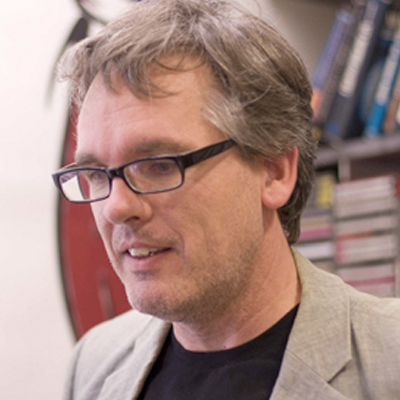The Fundamental Mechanisms Underpinning Language Processing
Your phone rings, and with little effort you are able to respond to the sound, and begin a conversation with your friend on the other line. This effortless, and for most of us, daily, interaction, is no small feat. In fact, beginning with the vibrations in the ear to the perception of sound to organizing the sound, our brains are working hard to uncover what others are saying, and even more so, what it all means! Dr. David Poeppel, Director of the Department of Neuroscience at the Max-Planck-Institute in Frankfurt, Germany, and Professor of Psychology and Neural Science at New York University, focuses on the various processes that underpin auditory processing and language comprehension. His foundational language model, developed with collaborator Greg Hickok, has increasingly become the standard model for how language is processed in the brain, and his current research continues to unravel novel insights about auditory processing and language.
Using all the tools available, including behavioral methods, fMRI, MEG, EEG, and ECoG, Dr. Poeppel believes in utilizing the technology that is most relevant to the question he is investigating. This straightforward approach to scientific inquiry has resulted in exciting research that seeks to understand how the brain forms the basis for language processing. Therefore, his work is helping determine the spatial and temporal maps that form the basis of healthy language processing that is a prerequisite to understanding both developmental and acquired speech language disorders which include, autism, dyslexia, CAPD, and strokes. Informed by linguistic theory, neurophysiology, experimental psychology, and various clinical concerns, Dr. Poeppel’s research is grounded in scientific rigor but fueled by the hope of impacting society.
Current research includes:
-
Measuring Learning: Dr. Poeppel’s newest project takes an innovative crowd-sourcing approach to using neural oscillations as an index of attending to speech and learning in a group. Using EEG portable technology, he and his team measure the brain in a naturalistic setting: the classroom. The researchers are aiming to identify how students are learning and how their learning process is correlated with that of other students or their instructor. Additionally, not only is Dr. Poeppel studying the children’s learning experience throughout a school year, but the project has also helped to integrate STEM learning in the high school classroom setting. In fact, the children that are participating in the study are helping design the study, collect the data, and analyze the preliminary results as they are collected!
-
Brain Basis of Hearing Speech and Comprehending Language: Much of Dr. Poeppel’s time is spent trying to understand what the brain basis of hearing speech and processing or comprehending language is. While this is a task we do each day, surprisingly little is understood about the basic mechanisms that enable us to do so.
-
Temporal Coordination: When sound comes in the ear, vibrations in the ear lead to the perceived sounds we understand to be language. To do so, the brain must break connected sounds into little parts and make sense of them. Dr. Poeppel is investigating what mechanisms are available as the brain breaks down language into different sized parts, by studying the entire brain and the many parts involved in language processing.
-
When Language is a Challenge: Dr. Poeppel contributes to studies of brain oscillations and their role in language development. Thus far, his research suggests that dysfunctional brain oscillations may play a role in some disorders, such as dyslexia and autism. By better understanding the fundamental causes of these developmental disorders, Dr. Poeppel hopes to improve the language and learning process for individuals that are impaired.
-
Language and Music: Many of the processes that underlie language are also relevant in processing music. Dr. Poeppel and members of his team are engaged in a series of behavioral and brain imaging studies to understand how language and music draw on similar brain processes -- and how they are different.
Bio
Dr. David Poeppel became a researcher through a series of accidents. As an undergraduate, he studied biology, cognitive science, and philosophy but always dreamed of becoming a theater director. Despite his aspirations, Dr. Poeppel’s need for a paycheck led him to a position in a research lab one summer, working in a neurophysiology lab at MIT. While there, he started attending linguistics lectures, an area he had always been curious about but had never been able to explore. Over time -- as he learned more -- Dr. Poeppel was attracted to neuroscience and its promise of bringing together scientific knowledge and the potential impact it could have on society. Concurrently, he realized the current understanding of the brain basis of language was woefully inadequate. Dr. Poeppel helped fill in the missing understandings behind language’s neurological mechanisms with his research that has since continued to shift the very ways we understand language today.
Dr. Poeppel’s dedication to his research is evidenced by his rigorous research and his joint appointments as a Professor at New York University and the Director of a the Max-Planck-Institute Frankfurt in Germany. Both his teams in the US and Germany collaborate closely with a “relentlessly interdisciplinary approach.” In addition to his strong ties with Germany, Dr. Poeppel also has strong ties to Latin America, especially Venezuela and Brazil, collaborating with other researchers interested in advancing our understanding of the brain’s role in language processing.
David Poeppel is a Professor of Psychology and Neural Science at NYU and the Director of the Department of Neuroscience at the Max-Planck-Institute (MPIEA) in Frankfurt, Germany. Trained at MIT in cognitive science, linguistics, and neuroscience, Poeppel did his post-doctoral training at the University of California San Francisco, where he focused on functional brain imaging. Until 2008, he was a professor at the University of Maryland College Park, where he ran the Cognitive Neuroscience of Language laboratory. He has been a Fellow at the Wissenschaftskolleg (Institute for Advanced Studies Berlin), the American Academy Berlin, and a guest professor at many institutions. He is a Fellow of the American Association for the Advancement of Science.


